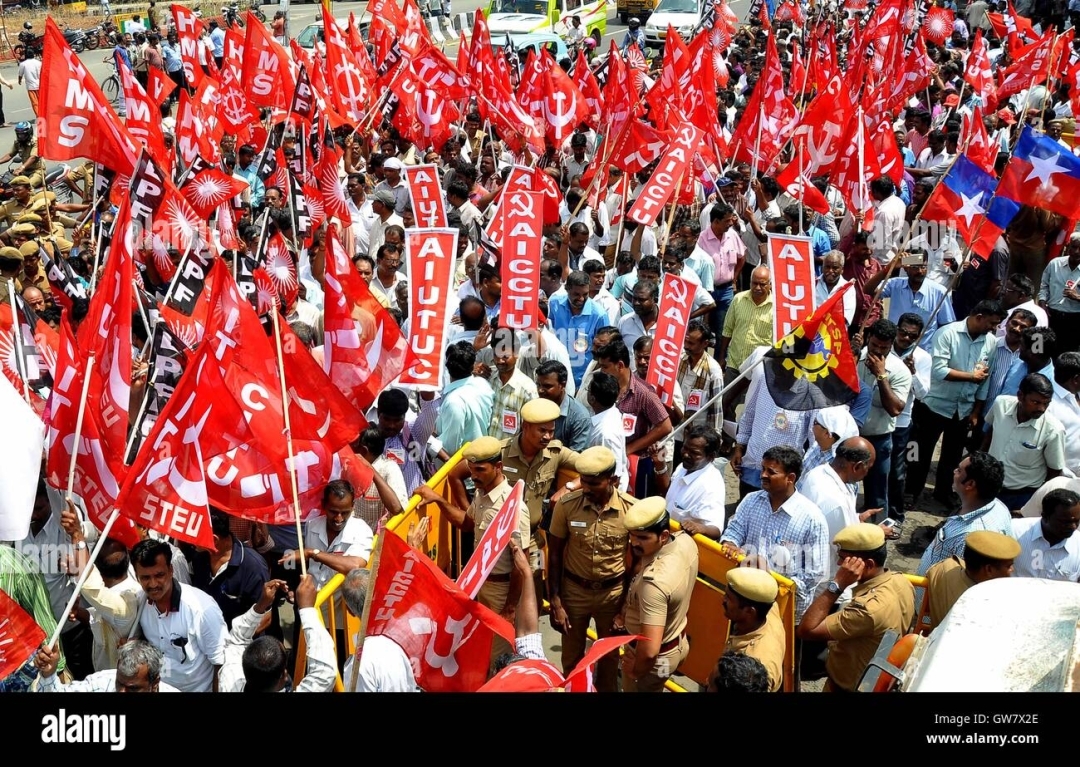TUs to force Anti-Terror Bill withdrawal

The Convenor of the Collective of All Trade Unions, Ravi Kumudesh said yesterday (04) that they will continue their trade union actions further until the Government decides to withdraw the new Anti-Terrorism Bill.
He said this while speaking to The Daily Morning after a protest march organised by the Collective against the new Anti-Terrorism Bill yesterday (04) in front of the Colombo Fort Railway Station. Members affiliated with nearly 100 trade unions participated in this protest. He also claimed that the protest march was very successful. The National Trade Union Centre (NTUC), the Professionals Trade Unions’ Association (PTUA), the Ceylon Teachers’ Union and the Ceylon Teachers’ Service Union were main parties that supported the protest march.
The trade unions also alleged that the main purpose of the new Anti-Terrorism Bill brought by the Government is repressing the trade union movement and other civil liberties enjoyed by the citizens. They also noted that they will continue the fight until this Bill is withdrawn.
Meanwhile, the Colombo Fort Magistrate had issued an order against the demonstration staged by the trade union activists after taking into account a request made by the Officer In-Charge of the Colombo Fort Police. Accordingly, the protesters were barred from marching towards the Presidential Secretariat, the President’s House and the Finance Ministry premises through several roads in Colombo – the Olcott Mawatha, the Lotus Road, the York Street, the Bank of Ceylon Mawatha, the Sir Baron Jayatilaka Mawatha, the Baladaksha Mawatha, the Chaithya Road, the Janadhipathi Mawatha and part of Galle Road from the Galle Face Green Roundabout between 12 noon and 4 p.m. yesterday. The Convenor of the NTUC, Wasantha Samarasinghe, the Inter-University Students’ Federation Convenor Wasantha Mudalige, Kumudesh and several other trade union activists had been named as the respondents in this Court order. The Police had been instructed to take necessary legal actions in the event the protesters engaged in any unlawful behaviour.
Moreover, the Archbishop of Colombo, Malcolm Cardinal Ranjith, who rejected the proposed Anti-Terrorism Bill which is to replace the Prevention of Terrorism (Temporary Provisions) Act (PTA), calling it a serious threat to justice, the rule of law and democracy, urged the people to oppose it.
Speaking at a media briefing held yesterday, he said that the Government, which had promised domestically and internationally to repeal the PTA, is now preparing to heavily restrict the fundamental rights of the people including the freedom of speech and expression and the right to protest and arrogate unlimited powers to the state through the proposed Bill. "Especially, the provisions of the Bill on the issuance of detention orders (DOs) are more dangerous than the provisions of the existing PTA. Like in the PTA, this also states that a person can be detained for up to three months on the basis of DOs, even on false allegations. This Bill also enables the extension of the DOs through a Magistrate for one year. This empowers the Government to suppress the liberties of citizens from multiple angles," he said. Speaking further, the Archbishop said that the clauses contained in the Bill that give the President unlimited power to ban certain organisations at their discretion are also leading towards a very serious situation. "The fact that there are no restrictions in this regard gives the President unlimited special power. There, the President can ban certain organisations if they feel that a certain organisation causes issues regarding the security of Sri Lanka or another country. The President is able to use that power even to suppress reasonable protests against the Government." "In this Bill, the offence of terrorism has been defined with minimum yardsticks so that it can be broadly interpreted. In this uncertain definition, those who have the power are able to interpret even ordinary activities as terrorist activities. Through such provisions, fair criticisms and protests against the Government can also be suppressed." Speaking further, Cardinal Ranjith said that the Bill has defined as acts of terrorism, the seeking of the support of international organisations against the anti-democratic activities of the country's rulers, and against obstructing essential services, jeopardising public health services, obstructing the safety of the public and even holding unauthorised meetings. "Instead of the PTA, which has been criticised not only locally but also internationally, the Government is trying to mislead not only Sri Lankans but also the international community by proposing an even more severe Bill. If there is anyone who votes in favour of this Bill, they are not for this country and its people. That is why we reject this Bill and ask the people to reject it as well," concluded the Archbishop.
The newly drafted Anti-Terrorism Bill was gazetted last month (March), and the Minister of Justice, Prison Affairs and Constitutional Reforms, President’s Counsel Dr. Wijeyadasa Rajapakshe said recently that the Bill is scheduled to be tabled in the Parliament this month. The existing PTA came into effect in 1979 as a temporary measure during the civil war and it was later made permanent in 1982. Since its enactment, the PTA was heavily criticised, with both local international organisations including the United Nations, the Human Rights Watch and Amnesty International repeatedly urging the Sri Lankan authorities to repeal the Act, which is usually referred to as a ‘draconian’ piece of legislation. The latest bill was proposed to replace the controversial PTA, however, Opposition political parties and many rights advocates including the International Commission of Jurists have raised serious concerns about the new bill.
